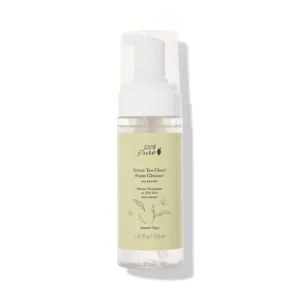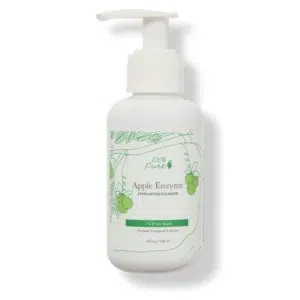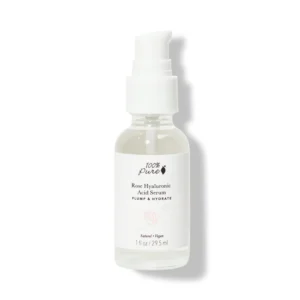Conquering Oily Skin Naturally

Does your midday mirror check reveal an unwelcome oil slick? You’re not alone. Oily skin can be a frustrating concern, but ditch the harsh chemicals and embrace the power of nature! Plant-based skincare offers a gentle yet effective approach to achieving that balanced, shine-free complexion you’ve always desired. This informative guide delves into the world of plant-powered skincare, exploring the science behind key ingredients, navigating potential challenges, and empowering you to create a personalized routine that works for your unique needs.
Unveiling the Powerhouse Plants
Mother Nature provides a treasure trove of botanical ingredients specifically suited for oily skin. These plant powerhouses work in various ways to combat shine, promote balance, and keep your skin healthy and radiant.
-
Balancing Besties: Green tea emerges as a champion for oily skin. This antioxidant powerhouse boasts anti-inflammatory properties that soothe irritation and calm redness. Additionally, green tea helps regulate sebum production, the natural oil produced by your skin, preventing excessive oiliness. Witch hazel, a natural astringent, joins the team by tightening pores and minimizing their appearance. This translates to a reduction in excess oil, leaving you with a shine-free, refreshed look.

-
Exfoliating All-Stars: Buffing away dead skin cells is essential for maintaining a healthy complexion, especially for those with oily skin. However, harsh scrubs can irritate and worsen oiliness. Thankfully, nature provides gentler alternatives. Brown sugar offers a beautifully textured exfoliant that removes dead skin cells without stripping away natural oils. Oatmeal, another gentle hero, effectively removes dead skin while soothing and calming the skin. Papaya joins the party with its enzymatic properties that gently break down dead skin cells, promoting a smoother, brighter complexion.
7% Fruit Acids Apple Enzyme Exfoliating Cleanser

-
Hydration Heroes: It might come as a surprise, but oily skin craves hydration just as much as any other skin type. Dehydrated skin can actually trigger increased oil production as the skin tries to compensate for a lack of moisture. Jojoba oil, despite its name, is a liquid wax that mimics your skin’s natural sebum. This allows jojoba oil to balance oil production while keeping your skin hydrated. Hyaluronic acid acts like a magnet, attracting and retaining moisture in the skin. This translates to a plump, healthy look and a reduction in the appearance of fine lines and wrinkles.

Finding Your Plant-Perfect Match
While plant-based solutions offer a multitude of benefits, it’s important to acknowledge some potential trade-offs when formulating your skincare routine.
-
Gentle Giants vs. Powerhouses: Some natural ingredients might not be as potent as their synthetic counterparts. For example, tea tree oil, a natural antibacterial agent known for its effectiveness in combating blemishes, can be quite drying, especially for those with sensitive skin. Finding the sweet spot between effectiveness and gentleness is key. Consider diluting harsher natural ingredients with carrier oils like jojoba oil or almond oil to create a more balanced solution.
-
DIY Delights or Pre-Made Marvels?: Mixing up your own honey or oatmeal mask can be a fun and budget-friendly way to incorporate plant-based skincare into your routine. However, DIY masks might not be as convenient or consistent as store-bought products formulated for your specific needs. Pre-made products often undergo rigorous testing to ensure their efficacy and safety, and they come in single-use packages for mess-free application.
-
Sensitivity Matters: Patch testing is crucial, especially for those with sensitive skin. Natural ingredients can sometimes trigger allergies or irritation. To patch test, apply a small amount of the product to your inner arm and wait 24 hours. If you experience any redness, itching, or burning, discontinue use and consult a dermatologist.
Cultivating a Routine that Works for You
The ideal plant-based skincare routine is the one that caters to your unique needs and skin type. Here are some questions to ask yourself when crafting your personalized routine:
-
Skin Type: Does your oily skin also experience breakouts? Look for ingredients like green tea or witch hazel that address both concerns. These ingredients offer anti-inflammatory and pore-minimizing benefits, helping to reduce breakouts and keep your skin shine-free.
-
Sensitivity Level: If your skin is easily irritated, opt for gentler plant-based ingredients like aloe vera or cucumber. Aloe vera boasts soothing and hydrating properties, while cucumber offers a cooling and calming effect. Patch testing is a must, regardless of the perceived gentleness of an ingredient.
-
Lifestyle Factors: Diet and stress can significantly impact oil production. Consider incorporating a balanced diet rich in fruits, vegetables, and whole grains to provide your skin with the nutrients it needs to thrive. Additionally, managing stress levels can help regulate hormone fluctuations that can contribute to oily skin.
Creating Your Plant-Powered Haven: A Step-by-Step Guide
Now that you’re armed with the knowledge of powerhouse plant ingredients and the importance of personalization, it’s time to craft your very own plant-based skincare routine! Here’s a step-by-step guide to get you started:
-
Cleanse Wisely: Cleansing is the cornerstone of any good skincare routine, and oily skin is no exception. Look for gentle, plant-based cleansers formulated with ingredients like green tea, witch hazel, or cucumber. These cleansers will remove excess oil, dirt, and makeup without stripping your skin of its natural moisture barrier. Opt for a foaming cleanser for a refreshing clean or a cream cleanser for a more hydrating experience.
-
Exfoliate Gently: Exfoliation is essential for removing dead skin cells that can clog pores and contribute to breakouts. However, for oily skin, harsh scrubs can be too aggressive. Opt for a gentle exfoliating product two to three times a week. Consider a brown sugar scrub for a bit of texture, oatmeal for a soothing experience, or a product containing papaya enzymes for a brighter complexion.
-
Embrace Hydration: As discussed earlier, oily skin craves hydration. Look for lightweight, oil-free moisturizers formulated with hyaluronic acid or jojoba oil. These ingredients will provide your skin with the moisture it needs without clogging pores or leaving a greasy residue. Gel-based moisturizers are a great option for oily skin, as they offer a lightweight, hydrating texture.
-
Mask Magic: Treat yourself to a weekly pampering session with a plant-based face mask. Clay masks, particularly those containing kaolin or bentonite clay, are excellent for absorbing excess oil and minimizing pores. Honey masks offer antibacterial properties to combat blemishes, while oatmeal masks provide a soothing and calming effect. Patch test any mask before applying it to your entire face.
-
Sun Protection is Non-Negotiable: Regardless of your skin type, sun protection is crucial. Choose a lightweight, non-comedogenic (meaning it won’t clog pores) sunscreen with SPF 30 or higher and broad-spectrum protection. Apply sunscreen daily, even on cloudy days, to shield your skin from harmful UV rays. Look for sunscreens formulated with mineral ingredients like zinc oxide or titanium dioxide, as these tend to be gentler on oily skin.
Frequently Asked Questions
Here are some commonly asked questions regarding plant-based skincare for oily skin:
- Can I use plant-based oils on my oily skin?
While it might seem counterintuitive, some plant-based oils, like jojoba oil, can actually benefit oily skin. Jojoba oil mimics your skin’s natural sebum, helping to regulate oil production. However, it’s important to choose non-comedogenic oils and apply them sparingly.
- What are some good plant-based ingredients for blemishes?
Tea tree oil is a natural antibacterial agent that can help combat blemishes. However, it can be drying, so dilute it with a carrier oil before applying it to your skin. Witch hazel also offers some blemish-fighting properties by minimizing pores and reducing inflammation.
- How long will it take to see results with a plant-based skincare routine?
Everyone’s skin reacts differently, but you should start to see some improvement in your oily skin within a few weeks of using a consistent plant-based skincare routine. Be patient and allow your skin time to adjust to the new products.
Plant-based skincare offers a gentle, effective way to achieve a healthy, balanced complexion for oily skin. By understanding the science behind key ingredients, navigating potential challenges, and personalizing your routine, you can harness the power of nature to achieve the radiant, shine-free skin you’ve always desired. So, embrace the plant power within and embark on a journey towards a healthier, more beautiful you!

